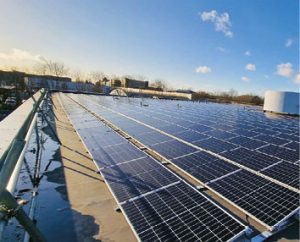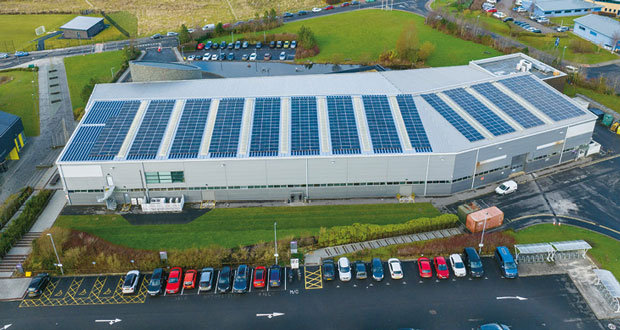 Solar panels could be the cure for the energy crisis hangover, says James Cunningham, MD, Geo Green Power
Solar panels could be the cure for the energy crisis hangover, says James Cunningham, MD, Geo Green Power
Energy prices may have stabilised, but they have certainly not returned to pre-energy crisis levels. Ultimately this means paying more for energy, and with budgets going to cover rising bills, they’re not being invested in other key areas.
The only way to significantly reduce your utility bill in today’s energy market is to reduce how much you use. Energy saving measures, such as LEDS, have an impact, but generating your own electricity is a game changer.
Businesses who invested in solar PV prior to 2022, have an added benefit of being cushioned from the energy crisis because the electricity generated by their solar panels continued to flow into the business at the same fixed rate as they did before prices began to soar. And if they had opted for battery storage, they were truly making the most of their free, green energy.
Over the last 18 months we have been working with Inchcape UK, installing solar PV on 37 of their car dealerships. These large sites with significant roof space have been perfect for solar panels and many of the bigger sites operate entirely without grid energy for significant parts of the day throughout the year. In total we have fitted 4.1MWs on Inchcape’s roofs which is delivering around £1 million of utility bill savings a year.
It’s important to understand that if you are yet to investigate renewables, you have definitely not missed your opportunity. Over the last two years component manufacturing has increased to meet a growing demand and the cost of materials and installation has fallen. The combination of reduced installation costs and higher energy prices make solar PV a very attractive proposition
BATTERY STORAGE
Another significant change impacting the cost calculations for solar PV is that the price of battery storage is starting to come down. Solar battery storage stores any excess energy being produced through solar panels for use at a later time, when solar generation isn’t meeting demand. It enables companies to maximise their free, green energy before they start importing energy from the grid.
Battery storage can also be configured to provide back-up power in the event of a power cut. For many businesses, whose highest demand is during the day, battery storage won’t be necessary, but it is increasingly becoming more cost effective and something to investigate as part of a system design. It can also be retrofitted to existing solar PV systems which are exporting considerable amounts of power to the grid.
An investment in renewables is two-fold, it’s an instant win for energy bill savings but as importantly it’s an investment for the future energy security and sustainability of your operation. The UK Government has made a commitment to achieve net zero by 2050, and many corporations have pledged to reach this target in the next decade. Whether you wait for new legislation to be rolled out, or take action now, improving the sustainability of your operations will be a road all FMs must take.
As the urgency around climate change increases and awareness grows it adds increasing consumer pressure for private companies to do more. As retailers and B2C businesses look to attract the ‘green pound’, worth over £120 billion in the UK, their environmental credentials come under greater scrutiny.
Every business is in control of their own scope 1 and 2 emissions, but scope 3 are reliant on their supply chain. With this in mind, your scope 1 and 2 emissions will directly impact your customer’s scope 3, and the sector you are operating in will determine the urgency in which you need to address them.
VALUABLE INVESTMENT
Investing in solar PV is one of the easiest ways to make an instant impact on emissions, and it’s often the first logical step to take. We supported the Nuclear Decommissioning Authority (NDA) last year in reducing their emissions by 88 tonnes of CO2 a year with a 250kW installation at their Energus Conference Centre in the Lake District, keeping their sustainability plans on track.
 Regardless of whether you are striving to hit an ambitious net zero deadline, or addressing spiralling energy bills, the big benefit of renewables is the real savings you make that can be reinvested elsewhere. When renewables are part of your sustainability programme, they help fund further projects that are more challenging to address.
Regardless of whether you are striving to hit an ambitious net zero deadline, or addressing spiralling energy bills, the big benefit of renewables is the real savings you make that can be reinvested elsewhere. When renewables are part of your sustainability programme, they help fund further projects that are more challenging to address.
A recent PwC survey of 750 businesses identified that 77 per cent of respondents have increased the cost of their products due to energy price rises and 81 per cent expect them to rise further this year. If you’re struggling to absorb energy costs you are definitely not alone, and if you are yet to look at renewables I strongly recommend that you do for all of the reasons above.





